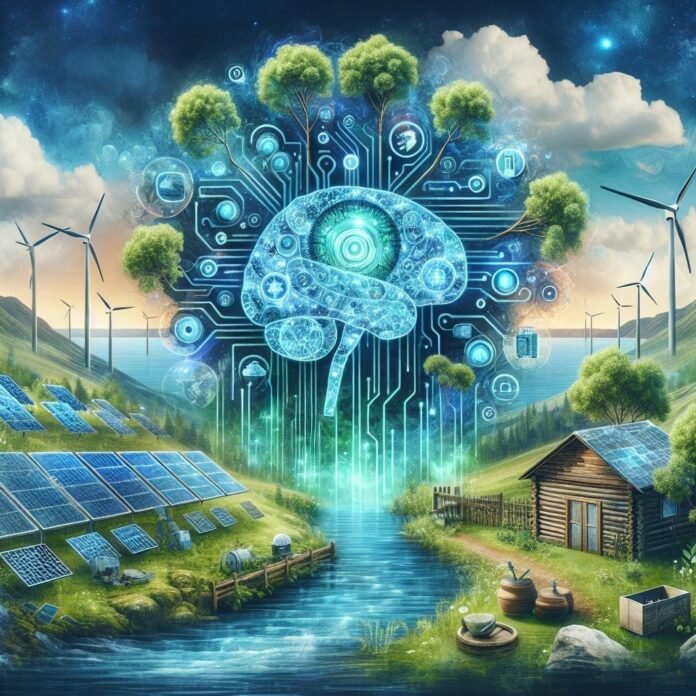In an era where sustainability and self-sufficiency are more than just buzzwords,off-grid living is becoming an increasingly appealing lifestyle choice for many. As we seek to reduce our carbon footprints and embrace a simpler way of life,the challenge of sourcing and efficiently managing energy in remote or rural areas has never been more pressing. enter the realm of artificial intelligence (AI): a transformative force that is revolutionizing the way we approach off-grid energy solutions. From optimizing solar panel performance to predicting energy needs with remarkable accuracy, AI-driven technologies are not only enhancing the efficiency of renewable energy systems but also empowering individuals and communities to thrive independently.In this article, we will explore how these innovative solutions are reshaping off-grid living, offering new possibilities for those looking to harness the power of nature while maintaining a high standard of living. Join us as we delve into the intersection of technology and sustainability, and discover how AI is paving the way toward a greener, more self-sufficient future.
Table of Contents
- Exploring the Role of AI in Renewable Energy Management for off-Grid Living
- Harnessing Predictive analytics for Enhanced Energy Efficiency in Remote Areas
- Smart Systems for Sustainable Self-Sufficiency: Integrating AI Technologies
- recommendations for Implementing AI-Driven Solutions in Off-Grid Energy Systems
- Key Takeaways
Exploring the Role of AI in Renewable Energy Management for off-Grid Living
The integration of artificial intelligence in renewable energy management is transforming how individuals approach off-grid living. Through advanced algorithms and machine learning capabilities, AI can optimize energy consumption and production by analyzing usage patterns and environmental conditions. this technology enables users to achieve a sustainable balance between energy expense and output,ensuring that energy generation from sources like solar and wind is maximized. Some of the core benefits include:
- Dynamic Load Management: AI systems can predict energy needs based on ancient data and real-time usage, adjusting power distribution accordingly.
- Predictive Maintenance: By monitoring system performance, AI can alert users to potential failures before they impede energy supply.
- Resource Allocation: Optimize the use of multiple renewable sources (solar, wind, hydro) based on availability and user demand.
Moreover, the deployment of AI in off-grid energy ecosystems allows for a more interactive approach to energy usage. For instance,smart sensors can communicate with AI software to assess weather forecasts,enabling more informed decisions about energy consumption and storage. Users can receive notifications through mobile applications to adjust their energy usage during peak times or when renewable resources are abundant.The following table summarizes key AI-driven tools beneficial for off-grid living:
| AI Tool | Functionality |
|---|---|
| Energy Management Systems (EMS) | monitors and controls energy distribution. |
| Smart inverters | Enhances the efficiency of solar panels and integrates with the grid. |
| Battery management Systems | Optimizes battery storage and performance. |
Harnessing Predictive Analytics for Enhanced Energy Efficiency in Remote Areas
In remote areas where energy access is limited, predictive analytics emerges as a game-changer, offering innovative solutions to maximize energy efficiency. By leveraging vast datasets gathered from various sources—such as weather patterns, consumption habits, and grid statuses—these analytics empower off-grid communities to forecast energy needs accurately. Consequently, energy systems can be optimized to ensure a sustainable supply, reducing waste and lowering costs. This proactive approach allows for a balance between energy production and consumption by enabling smarter storage and distribution options, ultimately driving down reliance on non-renewable energy sources.
A critical aspect of harnessing predictive analytics lies in its capability to integrate with AI technologies to automate decision-making processes. Communities can benefit from real-time monitoring and control systems that adjust energy flows automatically based on projected demand. Key advantages include:
- increased Reliability: Anticipating fluctuations in demand and adjusting accordingly minimizes outages.
- Cost Savings: Reducing excessive energy generation has a direct impact on financial resources.
- Enhanced Renewable Utilization: Efficiently channeling solar or wind energy based on predictions optimizes resource use.
With these tools at their disposal, remote communities are not merely recipients of energy but active participants in their energy management, paving the way for a more resilient and sustainable future.
Smart Systems for Sustainable Self-Sufficiency: Integrating AI Technologies
The advent of artificial intelligence has opened a new frontier for individuals seeking energy independence through off-grid living. By harnessing AI technologies, homeowners can optimize their energy production and consumption with unprecedented efficiency. Innovative systems can forecast energy needs based on weather patterns and historical data, allowing for dynamic adjustments to solar power generation and battery storage. This predictive capability not only minimizes waste but also maximizes savings, providing a compelling case for adopting smart systems in sustainable living endeavors.
Moreover, integrating AI-driven solutions with IoT devices transforms ordinary households into interconnected smart ecosystems.Residents can monitor energy usage in real-time, adjust settings remotely, and receive personalized recommendations for enhancing energy efficiency.The potential benefits extend beyond just energy savings; they include reduced carbon footprints and greater resilience in the face of power outages. As technology continues to evolve,the fusion of AI and sustainable practices will pave the way for a new standard in self-sufficiency,ensuring a more eco-friendly and economically viable lifestyle.
| AI Applications | Benefits |
|---|---|
| Predictive Energy Management | Optimizes energy usage and minimizes costs |
| IoT Integration | Real-time monitoring and control |
| Smart Battery management | Enhances lifespan and performance of energy storage |
| Automated adjustments | Maximizes energy efficiency and reliability |
Recommendations for Implementing AI-Driven Solutions in Off-Grid Energy Systems
To successfully implement AI-driven solutions in off-grid energy systems, it is indeed essential to take a structured approach. First, engage with stakeholders—including local communities, energy experts, and technology providers—to ensure everyone’s needs and perspectives are considered. Develop a detailed integration plan that outlines the key objectives and implementation milestones. This plan should prioritize the following:
- Data Collection: Gather relevant data on energy consumption patterns, resource availability, and environmental conditions.
- Predictive Analytics: Utilize AI algorithms to forecast energy needs and optimize resource allocation.
- User-Friendly Interfaces: Design intuitive applications that allow users to monitor and control their energy systems effortlessly.
Equipping off-grid communities with the right tools involves not only technology but also training and support. Offering workshops and training sessions focused on AI technology can empower users to understand and optimize their energy systems effectively. Moreover, consider forming partnerships with technology firms to create a robust support network, ensuring that communities have access to ongoing maintenance and upgrades. Refer to the table below for a summary of key best practices:
| Best Practice | Description |
|---|---|
| Community Engagement | Involve local populations in decision-making processes. |
| Continuous Learning | Provide training and resources for ongoing technology education. |
| Adaptive Strategies | Implement feedback loops to improve the AI algorithms over time. |
Key Takeaways
As we stand on the brink of a new era in off-grid living, it’s clear that AI-driven energy solutions hold immense potential to transform our approach to sustainable living. By harnessing the power of cutting-edge technology, we can create smarter, more efficient systems that not only reduce our carbon footprint but also enhance our quality of life, even in the most remote locations.
With the integration of AI, energy management becomes intuitive, responsive, and tailor-fit to the unique needs of each community or household. As we embrace these innovations,we open the door to an off-grid future that is not only energy-independent but also more resilient and adaptable to the challenges ahead.
So, whether you’re considering a transition to off-grid living or simply interested in the future of energy solutions, the possibilities are boundless. Let us continue to explore,innovate,and collaborate as we navigate this exciting frontier,ensuring that sustainable living is not just a dream,but a tangible reality for generations to come. Stay tuned for more insights and tips on leading a sustainable lifestyle, and join the conversation on how we can collectively revolutionize the way we harness energy in our daily lives.

